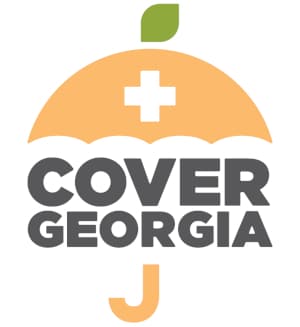Instead of expanding Medicaid, Governor Kemp created a new program called Georgia Pathways to Coverage. This program will cover some low-income adults, but it has a lot of rules and requirements.
To qualify for Pathways, you must meet all of these four requirements:
- Be a U.S. citizen or a qualified permanent resident
- Be between the ages of 19 and 64
- Have an income below the poverty line. (If you don’t know if your income is below the poverty line, use the chart below.)
- Be working or doing other qualifying activities for at least 80 hours per month.
If you are uninsured and meet these requirements, you can apply for Pathways. You can apply online at gateway.ga.gov or by phone at 1-877-423-4746.
If you need assistance with your application, GHF’s enrollment assisters are here to help! Click here to ask for their assistance.
What does this mean for Georgians?
Pathways is a complicated program with many rules and restrictions, so we expect only a fraction of eligible Georgians will get covered through the program. The Governor and his administration have estimated that between 31,000-100,000 Georgians will be able to enroll in Pathways. (Full Medicaid expansion would cover more than 400,000 Georgians.)
Some people who are likely to be left out include:
- Stay-at-home parents
- Caregivers for aging family members or children with a disability
- People in mental health or addiction recovery programs
- Rural residents and people of color who live in areas where good jobs are hard to find
- People who do not have reliable internet access or a car
These folks may not meet the requirements for Pathways or won’t be able to keep up with the tedious monthly reporting. They will likely be left behind.
Medicaid expansion: an easier, better solution
Pathways is a broken bridge that lets too many Georgians and too much money fall through the cracks. Because of its complications and restrictions, thousands of Georgians will remain uninsured, and our state’s tax dollars–which are meant to help families access health care and keep hospitals open–will sit unused in Washington, D.C.
Georgians deserve better. We deserve access to affordable, quality health care regardless of how little money is in our wallets. We deserve healthy hospitals whose doors are open to care for their communities. We deserve to visit the doctor when we’re sick and fill a prescription without worrying about whether to pay our rent or the medical bill.
Luckily Georgia leaders can replace Pathways with a program that is simpler, covers more people, costs less per person, and meets our state’s needs: Medicaid expansion!
How you can help
Here are some things you can do to get Georgians covered and keep up the calls for Medicaid expansion:
- Spread the word about Pathways. Tell the uninsured Georgians in your life about the program and encourage them to apply. Here is some helpful information to print and share:
- Uninsured in Georgia? flier
- Information about Pathways from the Georgia Department of Community Health
- If you apply for the Pathways program, tell us about it! We want to know if you got covered or were turned away. Record your story and enter a monthly $100 give away, sponsored by our partners at Vocal Video! GHF is committed to directly compensating select storytellers with electronic gift cards!
- If you are helping people enroll in Pathways, we want to hear from you too!
- Speak up for Medicaid expansion! Ask the Governor and our state legislators to expand Medicaid when they return to the state Capitol in January 2024.
- Don’t know what to say? We’ve got you covered. Here are some fast facts about Medicaid expansion that you can use to write or call your state leaders.
By working together, we can make sure that all Georgians–regardless of how much or little money they have–have health coverage and the access to care that comes with an insurance card.

